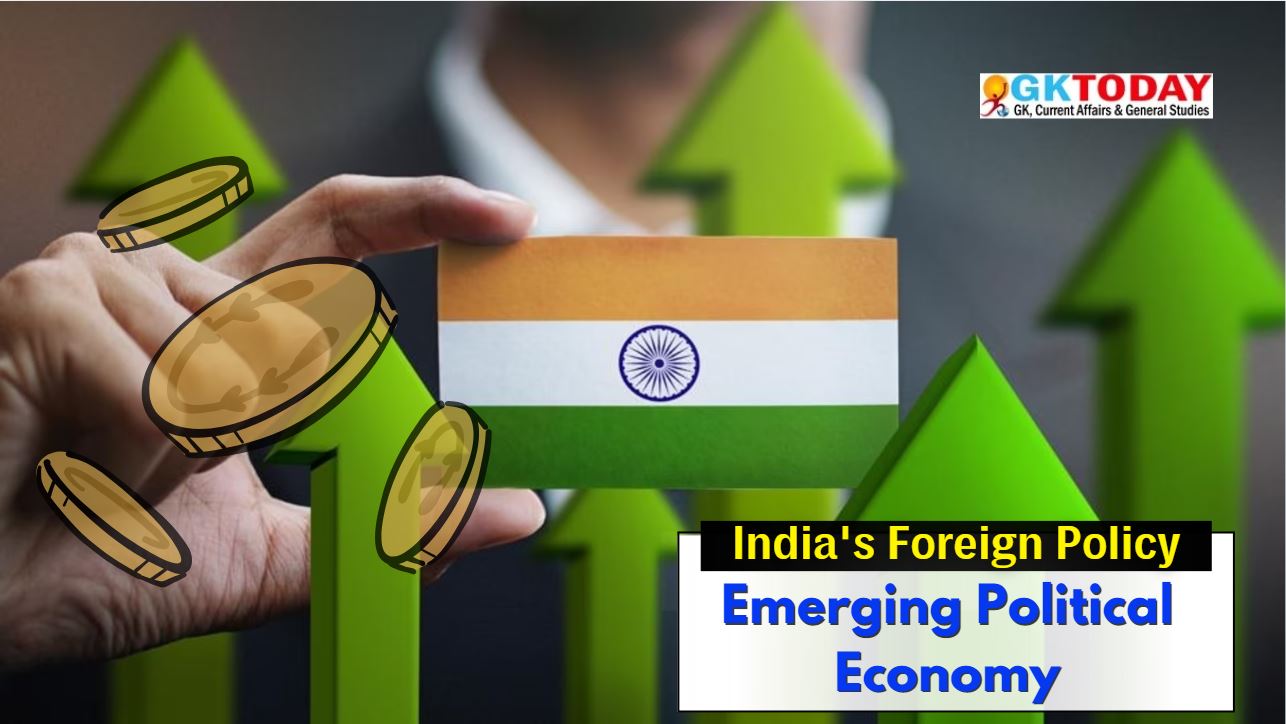India’s Foreign Policy and Economic Identity
India’s foreign policy is shaped by its identity as an emerging political economy. As the world’s most populous nation and one of the fastest-growing major economies, India plays role in global affairs.
India’s Economic Growth
India has consistently demonstrated remarkable economic growth.
- GDP Growth Rate: Over the last two decades, India has maintained an average GDP growth rate of 6-7%. This robust growth positions India among the fastest-growing major economies.
- Size of Economy: As of 2024, India ranks as the fifth-largest economy globally by nominal GDP, surpassing both the UK and France.
Demographic Dividend
India’s demographic profile presents both opportunities and challenges.
- Population: With over 1.4 billion people, India is the most populous country as of 2023.
- Youth Population: Nearly 50% of the population is under 25, providing a vast labour force that can drive economic growth.
Global Trade and Investment
India’s trade and investment landscape is dynamic and evolving.
- Foreign Direct Investment (FDI): Inflows of FDI reached over $81 billion in 2020-21, indicating strong investor confidence.
- Trade Partnerships: Major trading partners include the USA, China, UAE, and the EU. India is working to diversify these relationships further.
Technological Advancements
India is emerging as a global leader in technology.
- IT and Software Services: The IT sector contributes to exports and employment, establishing India as a hub for technology services.
- Start-up Ecosystem: India boasts one of the largest start-up ecosystems, with over 60 unicorns as of 2023, encouraging innovation and entrepreneurship.
Strategic Economic Initiatives
The Government of India has launched several initiatives to boost economic growth.
- Make in India: Initiated in 2014, this campaign aims to encourage manufacturing and attract foreign investment.
- Digital India: This initiative seeks to transform India into a digitally empowered society and knowledge economy.
Regional Economic Influence
India plays important role in regional economic cooperation.
- SAARC: As a key member of the South Asian Association for Regional Cooperation, India influences regional economic policies.
- BIMSTEC: India actively participates in the Bay of Bengal Initiative for Multi-Sectoral Technical and Economic Cooperation, enhancing regional ties.
Global Economic Institutions
India’s involvement in global economic institutions is .
- BRICS: India is a member of BRICS, focusing on cooperation with other emerging economies in various sectors.
- G20: India actively participates in G20 summits, contributing to discussions on global economic governance.
Challenges to Economic Identity
Despite its growth, India faces several economic challenges.
- Income Inequality: There are disparities in wealth distribution, with many living below the poverty line.
- Infrastructure Deficits: India requires substantial investment in infrastructure to support ongoing economic growth.
Environmental Sustainability
India is committed to sustainable development.
- Climate Change Commitments: India has pledged to reduce carbon emissions intensity and increase renewable energy capacity under the Paris Agreement.
- Sustainable Development Goals (SDGs): The nation is focused on achieving SDGs, promoting sustainable economic growth.
Geopolitical Considerations
India’s foreign policy is influenced by geopolitical dynamics.
- China’s Economic Rise: India’s economic policies are shaped by the need to counterbalance China’s growing economic and military power.
- US-India Relations: Strengthening economic ties with the United States is a priority, focusing on trade, technology, and defence collaboration.
Soft Power and Cultural Diplomacy
India leverages its cultural heritage to enhance global influence.
- Cultural Exports: Indian culture, yoga, and Bollywood serve as tools of soft power, promoting India’s image internationally.
- Diaspora Engagement: The Indian diaspora plays a vital role in providing economic and political support worldwide.
Future Prospects
India’s future economic trajectory is ambitious.
- Vision 2030: Government initiatives aim to make India a $5 trillion economy by 2025-26, signalling growth aspirations.
- Sustainable Economic Growth: The focus is on inclusive growth, innovation, and sustainable practices to enhance India’s global economic standing.
India’s identity as an emerging political economy is shaped by its dynamic economic growth, demographic advantages, and strategic initiatives. While it faces challenges such as income inequality and infrastructure deficits, its commitment to sustainable development and global cooperation positions it as a key player in the international arena.


